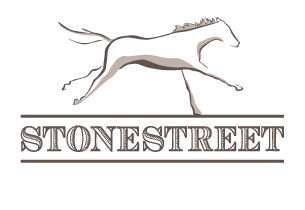Dotting the rolling hills of Stonestreet Farm is a group of mares enjoying their twilight years. These are the 11 mares that have retired from our broodmare band and now spend their days relaxing in their paddocks. Come meet our retired herd and learn how we keep them happy and healthy!
Mares will be retired or “pensioned” from breeding for a variety of reasons including reproductive soundness, medical issues, and old age. The decision is based on the health of the individual mare.
As our girls in gold enter their golden years, their needs change. Some of the most common issues facing older horses are arthritis, weight loss, and dental deterioration.
As with all our horses, our retired mares will spend the bulk of their time outside. While in their paddocks, they have access to shade and a run-in shed to protect them from the elements. Allowing the mares to enjoy the great outdoors helps them maintain muscle tone, flexibility, and mobility. Light exercise can lessen the symptoms of arthritis, which is a degenerative joint disease that causes stiffness and lameness in older horses (and humans!). The retired herd is visited by a farrier every 4 weeks, and the majority of the mares will go barefoot. Mares with extra podiatry needs will be visited more frequently, may wear supportive shoes, and will receive supplements to combat the effects of arthritis.
Horses will frequently experience weight loss in their later years. Our goal as managers is to keep our mares at a healthy body score. Older horses with low body condition scores have reduced immunity and ability to combat the elements. Our mares consume an easily digestible, high-calorie feed to keep them in good condition. We also ensure that they carry extra weight going into winter to curtail the effect of extra calorie needs in winter.
A horse’s teeth will continuously grow over the course of their life and require maintenance. Older horses are more likely to display tooth wear and tooth loss, which may prevent them from eating and cause them to lose weight. The retired mares will have their teeth checked and “floated” once a year. You can read more about the process and benefits of floating in our Dental Care blog.
Now that we’ve covered the care and considerations surrounding our retired herd, let’s meet some of the matriarchs!
